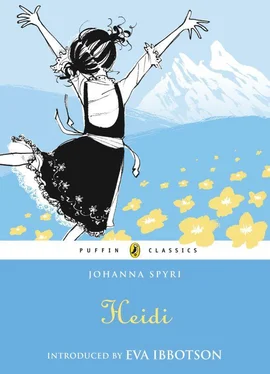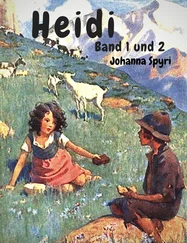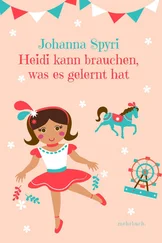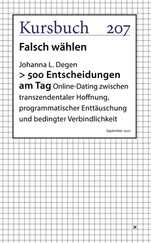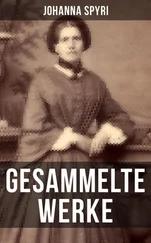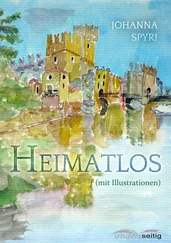Johanna Spyri - Heidi
Здесь есть возможность читать онлайн «Johanna Spyri - Heidi» — ознакомительный отрывок электронной книги совершенно бесплатно, а после прочтения отрывка купить полную версию. В некоторых случаях можно слушать аудио, скачать через торрент в формате fb2 и присутствует краткое содержание. Год выпуска: 2009, ISBN: 2009, Издательство: Penguin Books Ltd, Жанр: Детская проза, на английском языке. Описание произведения, (предисловие) а так же отзывы посетителей доступны на портале библиотеки ЛибКат.
- Название:Heidi
- Автор:
- Издательство:Penguin Books Ltd
- Жанр:
- Год:2009
- ISBN:9780141919010
- Рейтинг книги:2.5 / 5. Голосов: 2
-
Избранное:Добавить в избранное
- Отзывы:
-
Ваша оценка:
- 60
- 1
- 2
- 3
- 4
- 5
Heidi: краткое содержание, описание и аннотация
Предлагаем к чтению аннотацию, описание, краткое содержание или предисловие (зависит от того, что написал сам автор книги «Heidi»). Если вы не нашли необходимую информацию о книге — напишите в комментариях, мы постараемся отыскать её.
With a delightfully nostalgic introduction by award-winning author, Eva Ibbotson.
Heidi — читать онлайн ознакомительный отрывок
Ниже представлен текст книги, разбитый по страницам. Система сохранения места последней прочитанной страницы, позволяет с удобством читать онлайн бесплатно книгу «Heidi», без необходимости каждый раз заново искать на чём Вы остановились. Поставьте закладку, и сможете в любой момент перейти на страницу, на которой закончили чтение.
Интервал:
Закладка:
‘This is certainly the place for Clara to come to,’ he declared. ‘She would soon become a different person if she could eat as I have today, and get quite plump and rosy.’
There was a man coming towards them with a huge bundle on his back, and as he reached the hut, he lowered it on to the ground and filled his lungs with great draughts of mountain air.
‘Ah, here’s what came with me from Frankfurt,’ said the doctor. He went over and began to undo the parcel, then he said, ‘Now, my dear, you can unpack it for yourself.’
Heidi, speechless with excitement, began at once and when all the things had been spread out, she just stared at them in amazement. It was only when the doctor opened the box of cakes, and showed her that they were for Grannie to have with her coffee, that she found her tongue again. She wanted to hurry down with them at once, but her grandfather suggested they would go down together later on, when it was time for the doctor to leave. Then she found the pouch of tobacco, and how pleased the old man was! He filled his pipe at once, and after that the two men sat together on the bench, smoking and talking, while Heidi went on opening all her lovely presents. After a while she came across to them and waited for a pause in the conversation to say, ‘What you said was not right, Doctor. All these nice things put together aren’t as nice as seeing you!’ They both laughed at this pronouncement, which the doctor said he certainly had not expected.
As the sun began to go down, the doctor rose, thinking it time to go to the village and see about quarters. He took Heidi by the hand, and her grandfather carried the box of cakes, the shawl, and the sausage, and thus they went off together as far as Peter’s home. There Heidi said goodbye to the doctor and asked him:
‘Would you like to go up to the pasture with the goats tomorrow?’ for this was the greatest treat she could offer him.
‘That’ll be fine,’ he replied. ‘We’ll go together.’ The two men went on to Dörfli, and Heidi ran in to Grannie. Uncle Alp had put the presents down in front of the door, and Heidi fetched them in, one by one, first the cakes (and the box was so big she staggered under the weight), then the sausage and lastly the shawl. She brought them close up so that Grannie could put her hands on them and know what they were.
‘They’ve come all the way from Frankfurt, from Clara and Grandmamma,’ she explained, and both Grannie and Bridget were duly impressed. Indeed Peter’s mother had been too surprised to lend a hand and had simply stared while Heidi lugged the heavy things into the cottage.
‘Grannie, aren’t you pleased with the cakes? Feel how soft they are for you to eat.’
‘Yes, child. What kind people they are.’ The old woman stroked the warm, soft shawl. ‘This will be wonderful in the winter. I’ve never looked to have anything as fine as that.’
Heidi was surprised that she seemed to like the grey shawl even better than the cakes; but Bridget stood looking almost reverently at the sausage on the table. She had never seen such an enormous one before, and could hardly believe that it was all for her and Grannie and Peter. ‘I must ask Uncle what to do with it,’ she said, shaking her head doubtfully.
‘You’re to eat it, that’s all,’ declared Heidi.
And then Peter came tumbling in, calling out, ‘Uncle Alp’s just coming and Heidi’s to…’ He got no further for his eyes fell on the sausage, and the sight quite robbed him of speech. However Heidi guessed what he had been going to say and quickly kissed Grannie goodbye.
As a rule now, Uncle Alp never passed the hut without a cheery word for Grannie, and she always listened for his step. But this time it was late, more than time for Heidi to be in bed after getting up so early, for he was very particular about her having plenty of sleep. So he just called a greeting through the open door, took Heidi’s hand, and together they went on, up the path under the starry sky to their peaceful little home.
17
Happy Days
Early next morning the doctor climbed up from Dörfli with Peter and the goats. He tried several times to start a conversation, but without success. It was not easy to get Peter to talk, and he hardly got a word in answer to his questions. So they tramped along in silence most of the way, and when they reached the hut Heidi was waiting for them with Daisy and Dusky, all three in high spirits.
‘Coming up today?’ asked Peter as usual.
‘Yes, of course. The doctor is coming too,’ she replied.
Peter glanced sideways at the visitor. Then Uncle Alp came out, greeted the doctor warmly, and hung a bag of food over Peter’s shoulder. The bag was heavier than usual, for he had put in a good‐sized piece of dried meat, thinking the doctor might like to stay and eat his midday meal with the children. Peter grinned from ear to ear when he felt its weight, guessing that there was something special inside.
So they set off, Heidi surrounded by the goats who were pushing and shoving each other as usual in their efforts to get near her. She went a little way with them, then stood still. ‘Run along now,’ she said, ‘and don’t come back to bother me. I want to walk with the doctor today.’ Then she patted Snowflake and told her to be good.
The doctor had no difficulty in talking to Heidi. She chattered away all the time about the goats and their strange little ways, or the mountain peaks and the flowers and birds they would find up above. Several times on the way, Peter glanced sourly at the doctor, but no one noticed him. It seemed no time at all before they reached the pasture.
Heidi led the way to her favourite spot from which she could look down on the distant valley, so green below them, and up to the great mountains where the eternal snows sparkled in the sunlight. The grey rock of the two towering peaks rose majestic against the strong blue of the sky. The grass underfoot was dry and warm, and Heidi invited the doctor to sit down there and rest. They listened to the pleasant tinkling of the goat‐bells, as the herd moved about to graze. A few harebells remained of all the summer flowers and swung airily on their slender stalks in the morning breeze. The hawk was soaring overhead in ever‐widening circles, making no sound. Heidi’s eyes were happy as she gazed out at the beautiful things she loved so well, and she glanced at the doctor to see if he was enjoying them too. He caught her look and replied to it, though his eyes had not lost their sadness.
‘Yes, Heidi, it’s very beautiful here,’ he agreed, ‘but can a heart forget its sorrow and rejoice, even here?’
‘No one is sad here,’ she told him, ‘only in Frankfurt.’
A fleeting smile crossed his face. ‘But supposing the sorrow could not be left in Frankfurt, but dogged one up here too. What then?’
‘When you can do no more yourself,’ said Heidi confidently, ‘tell God.’
‘Those are good words, my dear,’ said the doctor, ‘but suppose it was God Himself who sent the sorrow.’
Heidi sat pondering for a while. She was sure God could always help, but was trying to find the answer out of her own experiences. ‘I think you have to wait,’ she said at last, ‘and keep on thinking that God has something good which He’s going to give you out of the sad thing, but you have to be patient. You see, when something’s awfully bad, you don’t know about the good bit coming, and you think it’s going on for ever.’
‘I hope you will always feel like that, Heidi,’ he said, and fell silent, drinking in the scene before him. Presently he went on, ‘Can you understand that even up here it is possible for sorrow to cast a shadow over the eyes so that one can’t really enjoy the beauty, and that adds to the sadness? Do you know what I mean?’
Читать дальшеИнтервал:
Закладка:
Похожие книги на «Heidi»
Представляем Вашему вниманию похожие книги на «Heidi» списком для выбора. Мы отобрали схожую по названию и смыслу литературу в надежде предоставить читателям больше вариантов отыскать новые, интересные, ещё непрочитанные произведения.
Обсуждение, отзывы о книге «Heidi» и просто собственные мнения читателей. Оставьте ваши комментарии, напишите, что Вы думаете о произведении, его смысле или главных героях. Укажите что конкретно понравилось, а что нет, и почему Вы так считаете.
